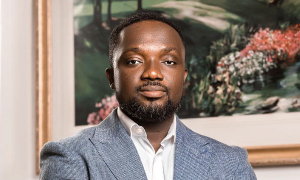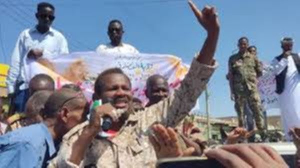A lecturer at the School of Administration of the University of Ghana, Legon, Dr Yaw Owusu-Frempong has strongly dismissed claims by government and the international community which sought to create the impression that corruption was under control in Ghana.
According to him, these statements and other self-seeking compliments by the government were, as a matter of fact, far from the truth since corruption still pertains in the system.
He noted that in spite of the declaration and promise by President Kufuor to fight against corruption of any kind during his swearing in swearing-in ceremony upon assumption of office, little or virtually nothing has been done to change the situation.
Speaking in an exclusive interview with the paper, he stressed that the fact that the president has not been able to keep his promise of 'Zero tolerance' for corruption in his government, was an indication that the saying was nothing but mere talk.
He therefore expressed doubt as to whether corruption was really used as a basis on which the said USD4.1billion debt relief would be given to Ghana by the G-8.
According to him, if that should be used as a criteria for granting the country any debt relief or loan facility, then the country is heading towards doom since nothing shows corruption has decreased over the years, and had rather become rife and a lucrative venture for especially, people in government.
He asked rhetorically, "if corruption index and statistics have not seen any dramatic change over the last five years since the NPP assumed office, what is this we are talking about that we are fighting corruption, when in fact, nothing is being done to decrease it?"
According to him, Ghanaians should therefore not be overjoyed upon hearing of such news because a similar thing was said about the then National Democratic Congress (NDC) government under the leadership of Flt Lt Jerry John Rawlings, with former President Clinton of America praising Ghana as being one of the best countries on the continent.
"We should also not forget that Dr Kwasi Botchway, the then Finance minister was touted as being the best in the continent, but where did all these accolades and compliments take the country in the long run? After leaving office, the government appeared to be one of the worst the country had ever experienced," he iterated, stating further that if these compliments are anything to go by, then we are only in for a big-time joke since Ghanaians know better than those who came up with the findings, especially when they don't give a true reflection of the situation.
He stated categorically that Ghana as a corporate entity and government as an institution of state have the responsibility of checking the high incidence of corruption but have not done much to nib the practice in the bud.
Dr Owusu-Frempong further noted that though the president has established an office of accountability at the seat of government which falls under his direct supervision, no report has so far been realised from that office, giving a clear indication of how subtle the office is.
He noted that the mere fact that the office falls under the president's supervision, should tell the world and Ghanaians in particular that the office of accountability as we are being made to believe, is not independent, hence likely to be subjected to all forms of manipulations and directions from government.
This, according to him, was because no evaluation had been undertaken on the said office.
He asked rhetorically, "who is going to be held accountable when the issue of Dr Anane and that of the controversial 'Hotel Kufuor' saga have just been treated as mere allegations and subsequently swept under the carpet without any enquiry whatsoever?"
According to him, when institutions like the Serious Fraud Office (SFO) and Commission on Human Rights and Administrative Justice (CHRAJ) are already in place to investigate and check corruption, where lies the need for another office for accountability which in effect is the responsibility of the aforementioned institutions?
He therefore described the establishment of the Office of Accountability as a "dissipation of resources."
What he said is being done is rather the dissipation of job titles without any definitive and significant role to impact on society.
According to him, lack of accountability and transparency leads to corruption in government and the public also seems cynical about exhortations such as "zero tolerance" by the political leadership to combat corruption as a subterranean activity.
Hence, he suggested that, what is required would perhaps be the use of "unconventional" methods such as electronic surveillance-wiretaping and close-circuit-hidden camera operations to curtail such practices.
General News of Wednesday, 22 June 2005
Source: Ghanaian Chronicle
















